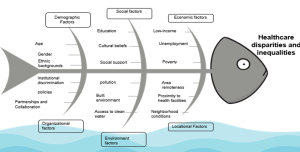FPX BHA 4020 Assessment 4 Paper Sample
SLIDE 2 : Statement of the Problem
- Healthcare disparities in the US pose a challenge by compromising care timeliness, affordability, and quality.
- Although citizens are entitled access to quality, affordable, and timely care, the prevailing inequalities result to inconsistent care delivery.
- Often, healthcare inequalities and disparities exist due to discrepancies in the social determinants of health (SDOH) such as ethnic, social, economic, environmental, and geographical factors.
- According to the Agency for Healthcare Research and Quality (AHRQ) (2021), health disparities manifest in the following Domains:
Access to person-centered care
Patient safety
SLIDE 3 : Statement of the Problem Cont’d
Effective treatment
Healthy living
Care affordability
Care coordination
According to Gomez et al. (2021), conditions in which people live, learn, work, and worship alongside their age and other demographic diversities, influence well-being and the overall healthcare access, experience, and affordability.
Due to the prevailing synergies between social determinants of health, it is not entirely easy to address health disparities.
Federal and state governments should prioritize on implementing evidence-based practice and proven interventions to ensure health equality and address disparities.
SLIDE 4 : Relevant Factors Associated with Health Disparities
As noted earlier, Americans exhibit diversities regarding social determinants of health (SDOH)
Discrepancies within economic, socio-cultural, geographical,. organizational, and environmental domains perpetrate health disparities. (Islam, 2019)
Therefore, the primary factors for healthcare inequalities include:
Disparities in economic status
Racial and ethnic differences
Differences in residential locations
Demographic factors such as age and gender
SLIDE 5 : Relevant Factors Associated with Health Disparities Cont’d
The Agency for Healthcare Research and Quality (AHRQ) collaborates with other federal agencies such as the Centers for Medicare and Medicaid Services (CMS) and the Centers for Disease Control and Prevention (CDC) to develop and update benchmarks for various health quality measures.
According to AHRQ (2021), these measures focus on Quality care determinants such as;
Access to insurance covers
Patient Safety
Populations’ quality of life
Levels of care coordination
Treatment effectiveness
SLIDE 6 : An Appropriate Analysis Tool to the Problem
Health inequalities pose multifactorial healthcare problems that require a comprehensive and reliable analytical tool.
A fishbone diagram can be an ideal tool for analyzing the root causes of health inequalities.
This tool contains a fish-like framework that enables comprehensive categorization of causative and contributing factors for specific health issues (Picarillo, 2018).
The head section contains the problem while the rib branches document different root causes.
This tool is also known as the Ishikawa causes and effects diagram.
SLIDE 7 : A Fishbone Diagram for Health Inequalities and Disparities
SLIDE 8 : Evidence-based Recommendations for Addressing Health Disparities and Inequalities
Medicaid expansion
Radley et al. (2021) argue that over 30 million Americans are still uninsured, especially people of color. Income and economic status contribute to disparities in access to Medicaid insurance covers. Therefore, expanding Medicaid by revising eligibility criteria can eliminate inequalities in care affordability and address the problem of uninsured and underinsured Americans.
Developing Community-based programs and policies for ensuring health equality
Localized interventions and programs can intercept and improve social determinants of health, including education, housing, built environment, healthcare justice, and literacy (Gomez et al., 2020).
The national and state governments should collaborate to attend to the root-causes of health disparities by implementing community-based interventions.
SLIDE 9 : Evidence-based Recommendations Cont’d
Eliminating organizational issues that result in health d
